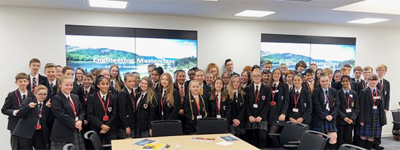08 Feb 2019
Encouraging STEM uptake
Beamont Collegiate Academy (BCA) is part of the recently formed TCAT (The Challenge Academy Trust), comprising of four high schools with high number of students from areas of social depravation from across the Warrington area. Beamont Collegiate Academy (BCA ) is the only high school in the United Kingdom to be awarded the STEM Assured Status.
 United Utilities has formed a partnership with TCAT, creating the first project of its kind, from within any multi academy trust nationwide, that aims to develop industry led, education inspired project learning from across STEM disciplines.
United Utilities has formed a partnership with TCAT, creating the first project of its kind, from within any multi academy trust nationwide, that aims to develop industry led, education inspired project learning from across STEM disciplines.
BCA’s engineering department was responsible for the successful launch and delivery of the first in a series of multiple academy trust based projects looking to develop students’ knowledge, understanding and aspirations within different curriculum areas with direct access to local industry based links.
The project was created by Jimmy Ingman, who began with a work placement within the Engineering department at United Utilities, at its Lingley Mere site. This led to meetings with a range of departments and specialist engineers who collaboratively created a 16 week STEM based project that focuses on a multi-disciplinary real world problem experienced by the country’s leading water supplier.
The STEM project saw 64 students from the 4 trust schools working with committed United Utilities’ engineers in an extracurricular enrichment activity. The mentors provided challenges, expert advice, guidance and the opportunity to work alongside students and give real world advice on career pathways and how industries tackle key issues set out within the projects.
Turning practice into a practical
TCAT students were set a challenge of developing a community centre based within the town of Coniston in the Lake District.
The students were encouraged to approach the tasks using a range of skills, offering them the opportunity to excel and develop r range of industry-based disciplines, including; research, design, problem solving, the ability to meet challenging deadlines and collaborative working.
This involved a number of key architectural engineering tasks, such as establishing a design brief, developing floor plans and elevation drawings, creating CAD models and 3D printing a working prototype.
The project also covered key environmental concerns directly related to a number of current United Utilities projects. The projects included sourcing a water supply and making a number of calculations to estimate costs, obligations the new building has to the environment and a number of opposing planning decisions and opinions from the area. This work led to a number of environmental research tasks focussed on developing a green build, including a number of eco-design features focussed solely on the long term sustainability aspirations of the building.
The project ended with an innovation challenge in which students were tasked with raising the water usage and/or waste awareness and aspirations of their users and needed to design and prototype a product that would do just this.
The winning team was selected through a process of formal panel presentations each lasting 15 minutes, followed by a question and answer session. This activity was supported by a market place activity, in which students were given the opportunity to discuss their project outlines in a less formal setting.
A points system took into account the supporting teachers, industry based mentors, judges and visiting staff at lead to prizes, including STEM centred apprenticeship links and tours of the United Utilities facilities.
Richard Ratcliff, Director of Engineering, sponsors the partnership with The Challenge Academy Trust.
Richard shares his highlights on the first Masterclass:
“The first Masterclass was a great success, eight teams took part over a 16 week period. Mentors from our engineering department offered support, guidance and advice to a diverse group of students. Over 45% of students said they were more interested in a STEM related career as a result of being involved. That for me is a real result.
“The teachers align the challenge to the curriculum, which ensures our involvement and commitment to the challenge not only targets harder to reach communities encouraging interest in STEM opportunities, it also allows students to develop their skills in related subjects.
The feedback, which is attached, was overwhelmingly positive. Students, teachers and mentors have